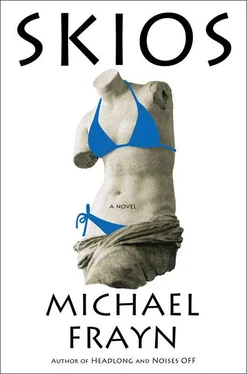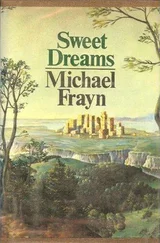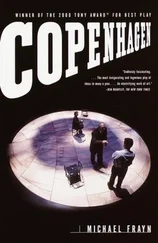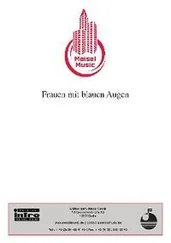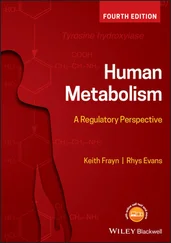Thus Oliver, standing there at the lectern with his mouth already open to bring into existence the wild series of inventions which would have sent the world off on a completely different causal trajectory, will have been preempted by the great gear chain of cause and effect — as it turns out to be with hindsight, now that it is actually happening. He set it in motion at the airport the previous evening, he is forced to realize, and the overwhelming probability is that it will now operate just as Newton, Einstein, and the real Dr. Norman Wilfred would wish. Each cause, he will almost certainly find it instructive to note, trails an effect at its heels like an obedient dog, each effect gratefully acknowledges a cause as its legitimate master. There is no room for any ridiculous impromptu interventions.
Clunk-click. Click-clunk. If only the initial conditions had been fully understood, and hindsight had been foresight, the whole sequence of events could have been predicted in time to be included in Newton’s Principia or the Book of Revelation.
However …
* * *
However, in the instant before Georgie waves and finally sets this well-prepared scenario upon its unstoppable course, something else occurs that stops it even before it starts. This is a completely unconnected and irrelevant event. A triviality, a passing thought in someone’s head, a velleity that comes out of nowhere and has no imaginable significance or place in any self-respecting causal chain.
One of the guests, Sheikh Abdul hilal bin-Taimour bin-Hamud bin-Ali al-Said — someone with no grievances, suspicions, or schemes of his own — happens to notice, in the dish of petit-fours on the table in front of him, a single remaining cube of Turkish delight. He doesn’t much like Turkish delight, but (as he explains at the subsequent government inquiry into the disaster) there is something unsatisfactory about the sight of one single Turkish delight sitting on its own in the dish, something that jars slightly with the natural order of things. So he reaches out idly to take it. And within the next few seconds the world has veered off the course that had been so carefully and elaborately prepared for it.
In reaching for the Turkish delight the sheikh has leaned across a candle. There is a smell of burning, and by the time he has popped the gelatinous cube into his mouth, and crushed it between tongue and palate, his robes are engulfed in flames. The people around him scramble to their feet in alarm. Chairs turn over. A voice, identified at the inquiry as belonging to either Suki Brox or Darling Erlunder, shouts, “Fire!”
Whereupon someone does.
It’s only a short burst in the first place, out of the darkness somewhere behind the speaker, probably from one of Mr. Papadopoulou’s security advisers, and exactly what he thinks he’s firing at is difficult to guess; but it’s followed by a second burst, which is most likely Mr. Skorbatov’s people firing back, after which the firing becomes general, and for a few moments the noise of shooting and screaming obliterates all possibility of rational reaction to events, and any semblance of ordered causality.
The screaming continues for some time after the shooting has ceased. By the time it has subsided, and people are beginning to emerge from where they have taken refuge behind pillars and under tables, the spotlights have been shot out to provide cover for the withdrawal of the more important business interests. The sheikh has also been extinguished, in this case by the bishop, who has wrapped him in his own robes, fireproofed against the candles used during the Orthodox liturgy, and the only illumination comes from the first faint moonshine and the few candles which have not yet guttered out or been knocked over in the panic.
When Dr. Norman Wilfred, or Oliver Fox as he has now in his state of shock reverted to being, gets up from the floor behind the table he finds the chairs in the darkness on either side of him empty; Mrs. Toppler and Mrs. Skorbatova have apparently been hurried away with their menfolk, together with the dead and wounded on both sides. Many of the other guests have fled as well. Some of those remaining are weeping or whimpering as they wander about in a state of post-traumatic shock, crunching broken glass underfoot, and falling into each other’s arms as they find their loved ones, or even their unloved ones, still alive.
Oliver recognizes one or two faces he had not expected to see looming up out of the darkness. Georgie … Annuka … As confused as everyone else, he wonders what they are doing here. Wasn’t Georgie coming tomorrow? Wasn’t Annuka remaining in London? Or had he heard a rumor that they were now living together somewhere?
Some of the people he knows seem to have been as unaware up to now of one another’s presence as he was of theirs, and a number of the predestined encounters do take place in one form or another. Everyone is too confused to be as surprised as they should have been, though, and the events have little of their expected force.
“I thought you were supposed to be giving the lecture, Wilfred?” says Georgie to a balding man who is distractedly trying to collect scattered pages of typescript. There is something that strikes Oliver as familiar about the name Wilfred, but he can’t remember what it is.
“Was I?” says Wilfred.
“Georgie?” says Nikki doubtfully. “So you’re here, then?”
“Nikki?” says Georgie likewise. “But you’re in Switzerland.”
“Am I?”
“Yes, and so are you,” says someone else to Georgie — a man Oliver remembers seeing somewhere once, a month or two before, who for some reason has the words “Happy Days” printed across his T-shirt.
“If I’m in Switzerland,” says Georgie, “why are you spying on me here?”
“Theta function,” says a little man in broken spectacles. “Lambda … phi…”
“Sixty-four euros,” say two bald-headed fat men suffering from warts. “Plus twenty-six euros’ waiting time.”
“Blood over my shirt!” says Annuka irritably. “A napkin, someone! Water! Oh, it’s from me. Someone fetch a dressing, please!”
There is a silence while Annuka dabs away at her shirt with her right hand, and bleeds onto it with her left.
Another man Oliver has never seen before is lying on the floor in T-shirt and skateboarding trousers, bulging in a hopeless, bloodstained kind of way. A strange creature is bending over him, holding a candle, and either feeling the victim’s pulse or robbing him. The creature’s lank gray hair falls around his face like some kind of mourning veil, and when he straightens up, his gaunt and wizened face in the candlelight reminds Oliver of a troll he once saw in a computer game. The creature gets to his feet and holds a small book aloft towards Oliver in a way that suggests silent accusation. For a moment Oliver believes it might be The Thoughts of Chairman Mao . He can see a picture of Chairman Mao’s face, but when the man brings book and candle threateningly closer, Oliver sees that the face is his own.
“Thank you,” he says. He takes his passport out of the troll-like creature’s hand and departs.
Within seconds of the eruption on the agora a kind of shock wave was radiating outwards through the rest of the foundation, as the guests scattered in terror to the shelter of their villas, or scrambled into their waiting limousines. Events by this time had become so complex that it was impossible to give any remotely adequate contemporaneous account of what was going on. It could only be reconstructed and recounted retrospectively. The Journal of Science Management was best placed to do this, since they had a correspondent on the spot, and they would have had an authoritative world exclusive on the disaster if Wellesley Luft, still hopelessly jet-lagged, had not slept through the entire proceedings. The official inquiry, though, was eventually able to put some sort of narrative together from what could be seen in the silent recordings of the various security cameras, and most of this material is now available on the Internet for anyone interested.
Читать дальше
